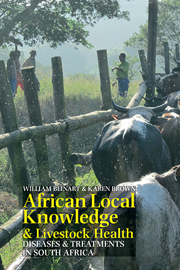Book contents
- Frontmatter
- Contents
- Acknowledgements
- Abbreviations
- Names of Common Diseases
- List of Maps, Photographs & Tables
- 1 Introduction: African Local Knowledge & Veterinary Pluralism
- 2 Ticks, Tick-borne Diseases & the Limits of Local Knowledge Introduction
- 3 ‘The Grave of the Cow is in the Stomach’: Environment & Nutrition in the Explanation & Prevention of Livestock Diseases
- 4 Transhumance, Animal Diseases & Environment
- 5 Plants & Drugs: Medicating Livestock
- 6 Medicinal Plants: Their Selection & their Properties
- 7 Animal Health & Ideas of the Supernatural
- 8 Gender, Space & the Supernatural
- 9 Conclusion
- Appendices
- Select Bibliography
- Index
9 - Conclusion
Published online by Cambridge University Press: 05 December 2013
- Frontmatter
- Contents
- Acknowledgements
- Abbreviations
- Names of Common Diseases
- List of Maps, Photographs & Tables
- 1 Introduction: African Local Knowledge & Veterinary Pluralism
- 2 Ticks, Tick-borne Diseases & the Limits of Local Knowledge Introduction
- 3 ‘The Grave of the Cow is in the Stomach’: Environment & Nutrition in the Explanation & Prevention of Livestock Diseases
- 4 Transhumance, Animal Diseases & Environment
- 5 Plants & Drugs: Medicating Livestock
- 6 Medicinal Plants: Their Selection & their Properties
- 7 Animal Health & Ideas of the Supernatural
- 8 Gender, Space & the Supernatural
- 9 Conclusion
- Appendices
- Select Bibliography
- Index
Summary
The dynamics of local knowledge
Understanding local knowledge has become a significant academic project amongst those interested in Africa and developing countries more generally. We have explored a central body of African knowledge about livestock diseases. We have drawn on the small but expanding field of what others call ethnoveterinary research but we have attempted to move beyond this literature. We have examined, first, changing patterns of local knowledge and the extent to which it has become hybridised. Second, we have analysed the relationship between local and scientific knowledge. Third, we have tried to understand an overarching range of ideas and practices and move beyond discussion of plant medicines, on the one hand, or witchcraft on the other.
Our informants were the descendants of communities that had been colonised well over a century ago. They have lived in a state that has imposed practices rooted in scientific conceptualisations of disease causation and control. State veterinary institutions and policies have touched the lives of their ancestors and themselves. Yet their ideas and consciousness have not been completely colonised or transformed by such interactions. To a surprising degree, we have found that rural African livestock owners worked with older but dynamic understandings of disease and treatment that interacted vigorously with changing scientific ideas and conceptions of modernity. Overall we suggest relatively limited penetration of biomedical ideas about germs, or parasites such as ticks, in the explanations of disease. The dominant form of understanding rested in environmental and nutritional concerns.
- Type
- Chapter
- Information
- African Local Knowledge and Livestock HealthDiseases and Treatments in South Africa, pp. 248 - 255Publisher: Boydell & BrewerPrint publication year: 2013



